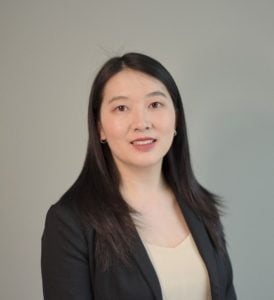This article is part of a series featuring Q&As with Ralph O’Connor Sustainable Energy Institute (ROSEI)-affiliated researchers. Next up is Yuting Luo, an assistant professor in the Department of Materials Science and Engineering and a ROSEI core faculty member. She joined Hopkins in January 2024.

Yuting Luo
How did you first get involved with or learn about sustainability?
Yuting Luo (YL): When I was an undergraduate student, I had the chance to join a research lab that was working on materials for batteries. I started to synthesize simple materials and do things like preparing the electrode and make coin cells. This is what inspired me to get involved more in clean energy and sustainability, and eventually, I decided to make it my career path.
Why are you passionate about sustainability/renewable energy?
YL: Nowadays global climate change is one of the most critical issues in the world. So, relying on renewable energy sources can contribute to reducing our reliance on damaging fossil fuels. The utilization of renewable energy is therefore a huge part of trying to reduce greenhouse gas emissions. Being involved in finding solutions to these essential and complex problems is my motivation.
How does your commitment to sustainability play out in your everyday life?
YL: I try my best to reduce energy consumption. I always turn off lights in rooms at my house when they aren’t being used, as well as unplug all devices that aren’t in use. I try to use energy-efficient appliances, including refrigerators and light bulbs. Focusing on making even the tiniest things energy efficient can make such a big difference.
I also think that minimizing waste is one of the most important things you can do, and the main way I try to do that is by staying away from using single-use plastics.
Tell us about your research and how it relates to sustainable energy efforts.
YL: My research is focused on material design to improve the performance, lifespan, and environmental impact of batteries. Battery research is a key pillar for sustainable energy efforts. It plays a crucial role in implementing the widespread adoption of renewable energy sources and improving overall energy efficiency.
Other renewable energy sources such as solar and wind are intermittent in terms of when they create energy. Battery technology allows storage of the excess energy generated during peak times and then makes them available when it isn’t a peak time for energy generation. Improving battery efficiency, energy density and charging capabilities contributes majorly to lessening the amount of greenhouse gases that are emitted.
Is there a book, article, or podcast that can help people understand your work better?
YL: The Energy Gang is a podcast that focuses on discussion and analysis of topics related to energy sustainability and transportation. There are a couple of hosts with different backgrounds that they bring to discussions. Listeners get updates on the latest developments in the energy sector; I thoroughly enjoy it.
What advice or suggestions do you have for students who want to pursue careers in sustainable energy?
YL: I recommend pursuing degrees in engineering, environmental science, sustainability, or some related discipline. I also recommend learning about chemistry, materials science, physics and engineering principles to better understand sustainable energy technologies. Having knowledge in a wide range of academic areas never hurts.
Why did you choose to join the Hopkins sustainable energy community?
YL: When I interviewed at Hopkins early last year, I was strongly inspired by ROSEI because it brings scientists, engineers, and researchers together to conduct studies developing new technologies and advancing our understanding of sustainable energy solutions. Everyone was also very nice and supportive. Everyone knows Hopkins has a lot of resources and focuses on education, which was important for me. I aim to not only achieve my research goals but also to inspire future professionals in this field. That’s why I chose Hopkins, and I am so excited to start.
